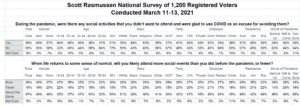Thirty-nine percent (39%) of voters say they were glad to use COVID as an excuse for avoiding social activities that they didn’t want to attend. A Scott Rasmussen national survey found that 55% did not and 6% are not sure.
When asked to describe the events they were most pleased to miss, many cited weddings, reunions, family get-togethers and holiday gatherings. Business-focused social events and school activities were also mentioned. One particularly blunt respondent said they used COVID as an excuse to avoid “Any event I deem useless or pointless.” Another said that being an introvert, this excuse provided a great sense of relief.
Among those who believe the worst of the pandemic is still to come, 50% used COVID as an excuse to get out of unwanted social events. Among those who believe the worst is behind us, just 34% did so.
As with many other findings on the pandemic, there is a significant partisan divide. Forty-seven percent (47%) of Democrats were pleased to use the COVID excuse. Just 27% of Republicans did the same. Urban voters were somewhat more likely to express this view than those who live in the suburbs or rural areas.
A separate question found that 19% expect to attend fewer social events than they did before the pandemic. Twenty-nine percent (29%) expect to do more socializing and 47% expect it won’t be all that different.
SIGN UP to receive Scott’s free email newsletter.
CHECK OUT Scott’s latest polls.
Note: Neither Scott Rasmussen, ScottRasmussen.com, nor RMG Research, Inc. have any affiliation with Rasmussen Reports. While Scott Rasmussen founded that firm, he left more than seven years ago and has had no involvement since that time.
Methodology
The survey of 1,200 Registered Voters was conducted by Scott Rasmussen using a mixed mode approach from March 11-13, 2021. Field work for the survey was conducted by RMG Research, Inc. Most respondents were contacted online or via text while 194 were contacted using automated phone polling techniques. Online respondents were selected from a list of Registered Voters and through a process of Random Digital Engagement. Certain quotas were applied, and the sample was lightly weighted by geography, gender, age, race, education, and political party to reasonably reflect the nation’s population of Registered Voters. Other variables were reviewed to ensure that the final sample is representative of that population.



